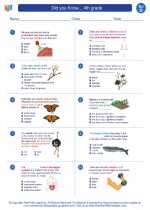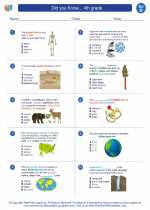Did you Know... 4th grade -> biotechnology
Biotechnology
Biotechnology is a branch of science that involves the manipulation of living organisms or their components to create useful products, improve plants or animals, or develop microorganisms for specific uses. It is a rapidly growing field with applications in various sectors such as medicine, agriculture, food production, and environmental conservation.
Topics to Cover in the Study Guide
- Introduction to Biotechnology: Understand the definition and scope of biotechnology. Learn about the historical development of biotechnology and its significance in modern society.
- Genetic Engineering: Explore the principles and methods of genetic engineering, including gene splicing, recombinant DNA technology, and gene editing techniques such as CRISPR-Cas9. Understand how genetic engineering is applied in medicine, agriculture, and industry.
- Biomedical Applications: Study the use of biotechnology in medicine, including the production of vaccines, therapeutic proteins, and gene therapy. Learn about the ethical considerations and controversies surrounding biomedical biotechnology.
- Agricultural Biotechnology: Explore the role of biotechnology in crop improvement, pest resistance, and the development of genetically modified organisms (GMOs). Understand the potential benefits and concerns related to GMOs in agriculture.
- Industrial Biotechnology: Learn about the applications of biotechnology in the production of biofuels, bioplastics, and other industrial products. Understand how bioprocessing and fermentation techniques are used in industrial biotechnology.
- Environmental Biotechnology: Study the use of biotechnology in environmental remediation, waste management, and sustainable resource utilization. Explore the role of bioremediation and bioaugmentation in addressing environmental challenges.
- Ethical and Social Implications: Consider the ethical, legal, and social issues associated with biotechnology, including privacy concerns, intellectual property rights, and the impact of biotechnological advances on society.
By covering these topics, you will gain a comprehensive understanding of biotechnology and its diverse applications in the modern world.
[Biotechnology] Related Worksheets and Study Guides:
.◂Science Worksheets and Study Guides Fourth Grade. Did you Know... 4th grade
Study Guide Did you Know... 4th grade
Did you Know... 4th grade  Worksheet/Answer key
Worksheet/Answer key Did you Know... 4th grade
Did you Know... 4th grade  Worksheet/Answer key
Worksheet/Answer key Did you Know... 4th grade
Did you Know... 4th grade  Worksheet/Answer key
Worksheet/Answer key Did you Know... 4th grade
Did you Know... 4th grade 

 Worksheet/Answer key
Worksheet/Answer key
 Worksheet/Answer key
Worksheet/Answer key
 Worksheet/Answer key
Worksheet/Answer key

The resources above cover the following skills:
Core Ideas for Knowing Science
Life Science
Organisms are organized on a cellular basis and have a finite life span.